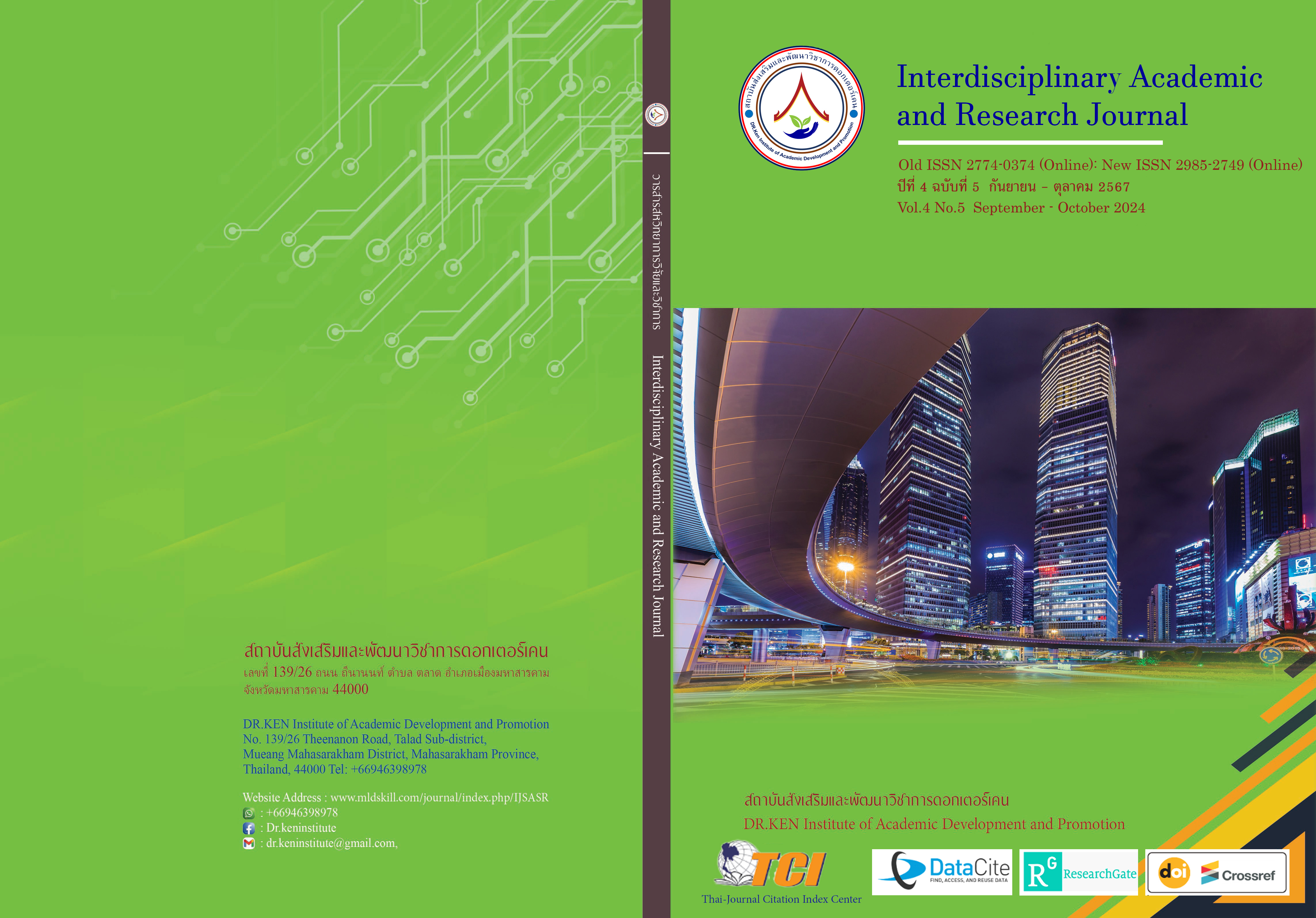The Use of Good Governance Principles in Educational Institution Administration by Administrators of Vocational Educational Institutions in Chonburi Province
DOI:
https://doi.org/10.60027/iarj.2024.276160Keywords:
Management According to Good Governance Principles, , Educational AdministrationAbstract
Background and Aims: Administrators are considered to be the people who play the most important role in promoting and developing a culture of democracy and good governance in educational institutions. The management ability of the administrators affects various operations in the educational institution in order to achieve maximum efficiency and effectiveness. This research aims to study and compare the use of good governance principles. Including guidelines for managing educational institutions under vocational education in Chonburi Province. Considering the gender, position, and work experience of executives in each area.
Methodology: The research sample consisted of 269 administrators and teachers in educational institutions under vocational education in Chonburi Province. The research instrument was a questionnaire with a 5-level rating scale with a confidence value of 0.97 and the concordance value (IOC) ranged from 0.8 to 1.00. There was a question about the use of good governance principles in the management of educational institutions among the said administrators. For data analysis, basic statistics were used, including frequency, percentage, mean, and standard deviation. Including testing with t-test and F-test to get accurate and reliable results.
Results: (1) The results of the study found that opinions regarding the use of good governance principles in the administration of educational institutions by administrators under the vocational education department in Chonburi Province Overall it is at a high level. (2) When classifying the use of good governance principles by gender It was found that overall there was no difference. But when considering each aspect It was found that the moral aspect transparency. And the responsibility aspect is significantly different at the 0.05 level, while there is no difference in other aspects. (3) For classification by status It was found that school administrators and teachers used good governance principles in the overall management of educational institutions. But when considering each aspect It was found that the principles of participation responsibility and value for money are significantly different at the 0.05 level, while other aspects are not different. (4) Classification according to work experience It was found that the overall use of good governance principles was not different. But when considering transparency, it was found that there was a statistically significant difference at the 0.05 level. While the rule of law, morality, value for money responsibility and there was no difference in participation.
Conclusion: The administration of an educational institution according to the principles of good governance consists of two groups of important people: 1) administrators, who are responsible for setting a clear vision, strategy, and policy for educational institution administration. 2) Teachers, whose role is to perform their duties in teaching and promoting the learning of pupils and students. Using a variety of teaching methods to develop students' full potential.
References
กระทรวงศึกษาธิการ. (2560). คู่มือการบริหารสถานศึกษาขั้นพื้นฐานที่เป็นนิติบุคคล. กรุงเทพฯ : องค์การรับส่งสินค้าและพัสดุ.
คณะกรรมการการอาชีวศึกษา. (2552). ระเบียบสำนักงานคณะกรรมการการอาชีวศึกษาว่าด้วยการ บริหารสถานศึกษา 2552. Retrieved from: http://venr-4ac.th/sites/venr-4/files/5t182 Rpishui06q2.pdf.
จรัส อติวิทนาภรณ์. (2554). หลักการและทฤษฎีทางการบริหารการศึกษา. สงขลา : สาขาวิชาการบริหารการศึกษา คณะศึกษาศาสตร์ มหาวิทยาลัยทักษิณ
นัยนา เจริญผล. (2552). การใช้หลักธรรมาภิบาลในการบริหารสถานศึกษาของผู้บริหารสถานศึกษา สังกัดสำนักงานคณะกรรมการการอาชีวศึกษาจังหวัดขอนแก่น. การค้นคว้าอิสระปริญญาครุศาสตรมหาบัณฑิต ม.ป.ป. มหาวิทยาลัยราชภัฏเลย, เลย
บุญชม ศรีสะอาด. (2553). การวิจัยเบื้องต้น. พิมพ์ครั้งที่ 8. กรุงเทพฯ : สุวีริยาสาส์น.
ไพฑูรย์ สุขผลานันท์. (2558). การศึกษาสภาพการบริหารงานตามหลักธรรมาภิบาลของผู้บริหาร สถานศึกษา สังกัดอาชีวศึกษาจังหวัดระยอง จันทบุรี และตราด. วิทยานิพนธ์ปริญญา- ครุศาสตรมหาบัณฑิต มหาวิทยาลัยราชภัฏรำไพพรรณี, จันทบุรี.
ไพรวัลย์ ชาคโร. (2558). การบริหารสถานศึกษาตามหลักธรรมาภิบาลของผู้บริหารโรงเรียนประถมศึกษา สังกัดสำนักการศึกษา สำนักงานเขตสายไหม กรุงเทพมหานคร. วิทยานิพนธ์ พธ.ม., มหาวิทยาลัยจุฬาลงกรณ์ราชวิทยาลัย, กรุงเทพมหานคร.
วิชุดา ดวงจุ้ย และ ในตะวัน กำหอม. (2564). การบริหารตามหลักธรรมาภิบาลของผู้บริหารสถานศึกษาจำนวนโรงเรียนอนุบาลเทศบาลอ้อมน้อย 2. วารสารลวะศรี มหาวิทยาลัยราชภัฏเทพสตรี, 5(2), 47-59.
สำนักงานคณะกรรมการการอาชีวศึกษา. (2552). ระเบียบสำนักงานคณะกรรมการการอาชีวศึกษา ว่าด้วยการบริหารสถานศึกษา. กรุงเทพฯ: สำนักมาตรฐานการอาชีวศึกษา.
อภินันท์ ลิ้มกุล. (2557). การใช้หลักธรรมาภิบาลในโรงเรียนวังเหนือวิทยา. การค้นคว้าอิสระปริญญาศึกษาศาสตรมหาบัณฑิต. มหาวิทยาลัยศิลปากร, นครปฐม.
Cronbach, L. J. (1990). Essentials of Psychological Testing. 5th ed. New York: Haper Collins.
Downloads
Published
How to Cite
Issue
Section
License
Copyright (c) 2024 Interdisciplinary Academic and Research Journal

This work is licensed under a Creative Commons Attribution-NonCommercial-NoDerivatives 4.0 International License.
Copyright on any article in the Interdisciplinary Academic and Research Journal is retained by the author(s) under the under the Creative Commons Attribution-NonCommercial-NoDerivatives 4.0 International License. Permission to use text, content, images, etc. of publication. Any user to read, download, copy, distribute, print, search, or link to the full texts of articles, crawl them for indexing, pass them as data to software, or use them for any other lawful purpose. But do not use it for commercial use or with the intent to benefit any business.
















.png)


